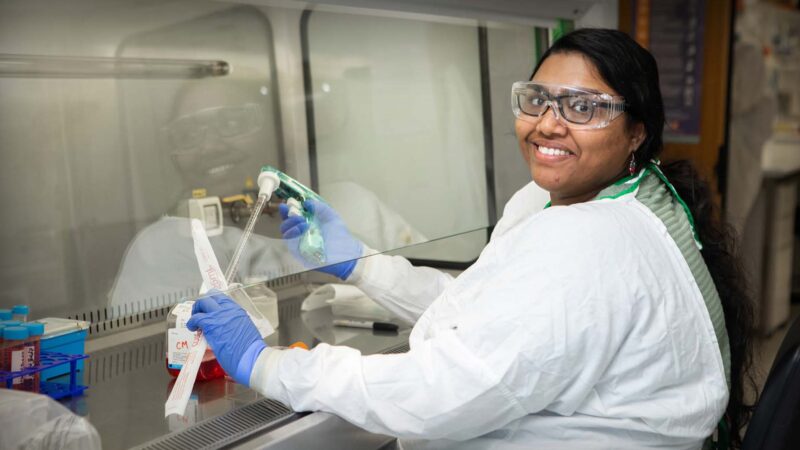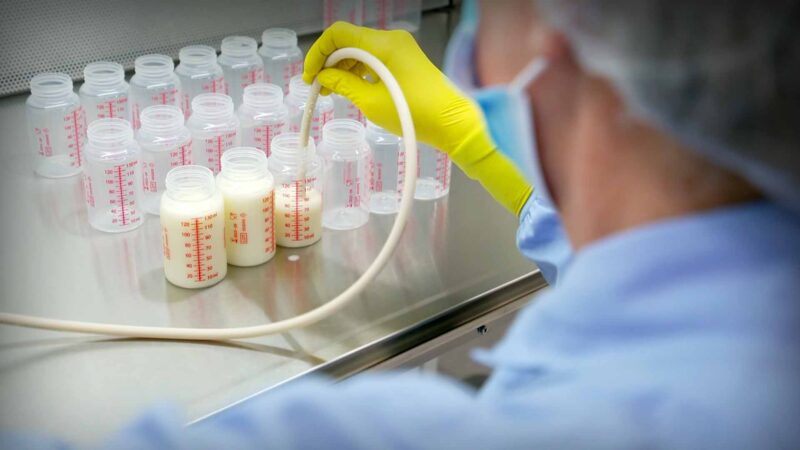ENVIRONMENTAL EXPOSURE TO FUNCTION OF LUNG EPITHELIAL STEM CELL BIOLOGY
Dr Clare Weeden
Laboratory Head
The Walter and Eliza Hall Institute of Medical Research (WEHI)
Melbourne, Australia
RESEARCHER PROFILE
Filmed in Melbourne, Australia | March 2025
Dr Clare Weeden has recently commenced as a Laboratory Head at WEHI in 2025, supported by the CSL Centenary Fellowship.
Dr Weeden specialises in lung epithelial cell biology in the context of homeostasis, inflammation, and lung cancer, particularly in people who don’t smoke. Her work endeavours to understand how past environmental exposures shape the responses of lung cells and the molecular mechanisms underlying this cellular recall, with the aim to develop novel early detection strategies for lung disease.
Dr Weeden completed her PhD studying lung squamous cell carcinoma initiation and treatment with Professor Marie-Liesse Asselin-Labat at WEHI, where she discovered distinct DNA repair abilities in lung stem cells that enabled their susceptibility to cancer, published in PLOS Biology.
Dr Weeden conducted postdoctoral research at WEHI and found that the pre-existing lung immune microenvironment had lasting effects on tumour immunogenicity and response to immunotherapy, published in Cancer Cell. She then continued her research on early tumour biology in Professor Charles Swanton’s laboratory at the Francis Crick Institute, London, where she was part of a team discovery that air pollution triggers inflammatory signalling in the lung that awakens previously dormant cells to initiate lung cancers in people who don’t smoke, published in Nature.
Dr Weeden is the past recipient of prestigious fellowships (Marie Sklodowska Curie Actions, Lung Foundation Australia Deep Manchanda Early Career Fellowship), research grants (Cancer Research UK, Mark Foundation, Cure Cancer/Cancer Australia) and has published 36 research publications with over 1000 citations.
Source: supplied
You Might also like
-
Using Gut Microbes to Reduce Blood Pressure
Professor Francine Marques is an National Health and Medical Research Council Emerging Leader, Viertel Charitable Foundation, and National Heart Foundation Fellow.
She leads the Hypertension Research Laboratory at Monash University and has published more than 120 peer-reviewed papers in journals such as Nature Reviews Cardiology, Nature Medicine, Nature Cardiovascular Research, and Circulation.
-
Nanoparticles & microparticles to combat antimicrobial resistance
Dr Anjana Jayasree is an emerging research leader in biomaterials, tissue engineering and nanotechnology, recognised internationally for her innovative work on antimicrobial nanoparticles and regenerative therapies. A Postdoctoral Research Fellow at The University of Queensland, she operates at the intersection of materials science, drug delivery and cellular biology, developing advanced metallic-based nanotechnologies to improve both human and animal health outcomes. Her expertise spans nanoparticle synthesis, cell–material interactions, and the design of sophisticated in vitro models to investigate soft-tissue integration, osseointegration, angiogenesis and biofilm formation.
-
Investigating the benefits of donor human milk for preterm infants
Together, SAHMRI and Lifeblood are leading a consortium to revolutionise the way human milk, and novel products made from human milk, are used as nutritional and medical interventions to improve health outcomes in vulnerable infants, but with potential application for a diverse range of medical indications.
Currently, babies who are born early preterm – before 32 weeks – are given donor milk when their own mother’s milk is not available or in short supply. Whether donor milk is beneficial for babies born just a few weeks early is unclear, as very little research has been undertaken with these babies.
The GIFT Trial will soon commence as an investigation between SAHMRI, the University of Adelaide, the Red Cross Lifeblood Milk Bank conducted at five sites across three states in Australia.



